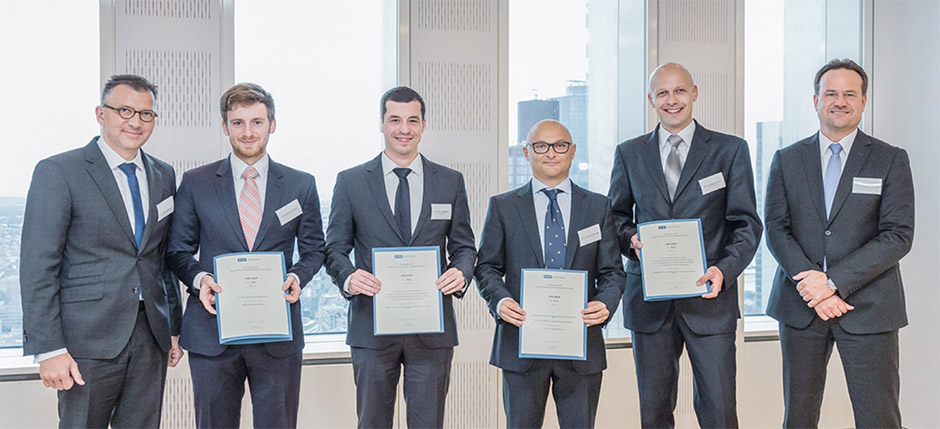Award winners
Research award 2016
Deka-Institute IQAM Research awards research prize for research on information processing in capital markets.
The private institute for quantitative capital market research of the DekaBank (IQAM Research) awarded its first research prize. The focus of the prize was on modern methods for capital market analyses, particularly big data, alternative investments and prediction models for capital markets.
The academic advisory committee of the institute evaluated the submissions based on the following criteria: relevance of the research question, quality of the theoretic-conceptual analyses and importance for the practical Portfolio-Management.
1. Price
The first prize was awarded to Roland Füss (University of St. Gallen), Markus Grabellus (EBS), Ferdinand Mager (EBS) and Michael Stein (University of Duisburg-Essen) for their paper „Something in the Air: Information Density, News Surprises, and Price Jumps.“
The researchers develop an information density indicator to provide a more comprehensive understanding of price reactions to news and to explain price jumps in financial markets. The information density indicator measures the abnormal amount of news before scheduled macroeconomic announcements. The empirical analysis shows that an increased information density leads to higher market uncertainty and elevates the probability for price jumps. The authors view their findings as an indication for inefficient capital markets: market participants are not able infer signals from news flows in the presence of noise, which hinders price discovery.
2. Price
The second prize was awarded to Heiko Jacobs (Uni Mannheim) for his paper “Market Maturity and Mispricing”. He analyzes market efficiency in developed and emerging markets investigating whether emerging markets are less efficient compared to developed markets and, therefore, tend to offer more potential for active management.
Relying on the Stambaugh, Yu, and Yuan (2015) mispricing score, Jacobs analyzes cross-sectional stock return predictability in 45 countries. The findings cast doubt on the notion that the markets outside of the most developed ones are necessarily less efficient: In contrast to the widely held belief mispricing appears to be at least as prevalent in developed markets as in emerging markets. The finding contradicts the efficient market hypothesis and demonstrates that active management can be advantageous.
3. Price
The third price was awarded to Rasa Karapandza (EBS) and Jose M. Marin for their work „The Rate of Market Efficiency“. The researchers test the ability of different asset pricing models in pricing random portfolios. The results indicate that the CAPM is the best performing model among five linear factor specifications including the Fama-French three-factor-model and four-factor-model and the Carhart-four-factor-model. Moreover, the authors analyze the rate of market efficiency based on the best asset-pricing model finding that market efficiency has almost doubled in the last four decades.

Criteria
IQ-Kap vergibt den Forschungspreis an Wissenschaftler, die sich schwerpunktmäßig mit der Nutzung von Big Data, Alternative Investments und Prognoseverfahren für Kapitalmärkte beschäftigen. Bei der Auswertung berücksichtigt der wissenschaftliche Beirat des Instituts insbesondere die Relevanz der Problemstellung und eine ausgewogene Verknüpfung von hochwertiger theoretisch-konzeptioneller Grundlagenarbeit und Praxisbezug.